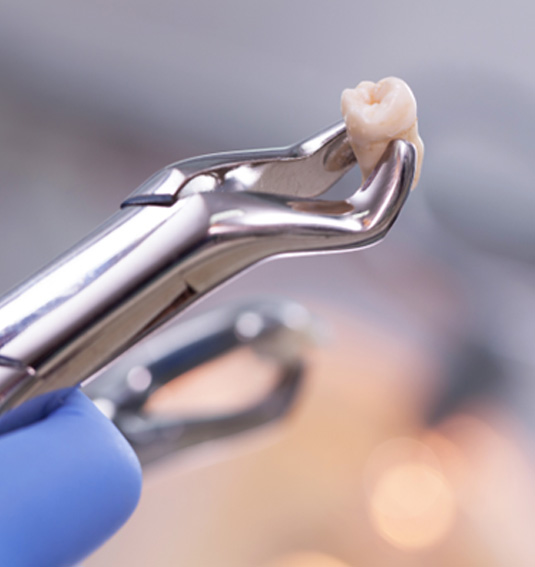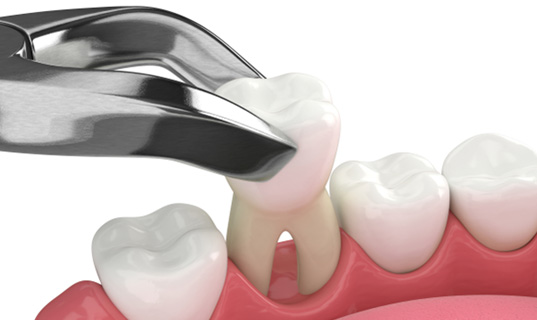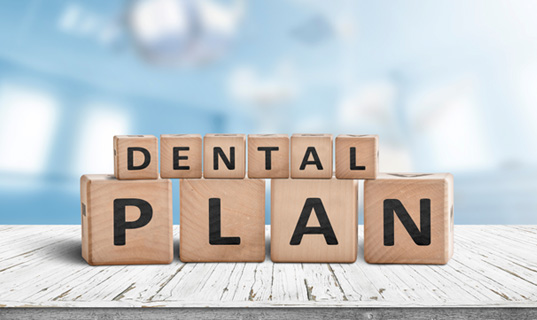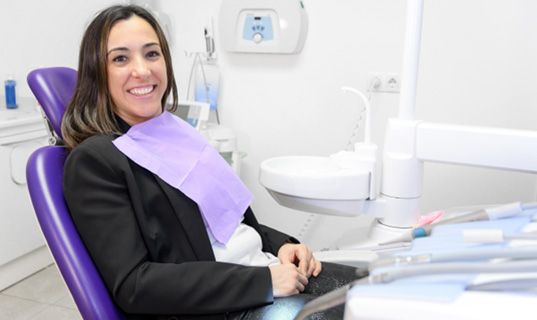Tooth Extractions Des Plaines
Make Space for a Healthier Smile
Under ideal conditions, teeth can last an entire lifetime! At Brite Smiles in Des Plaines, we do all we can to help our patients retain their natural dentition for as long as possible. In some cases, though, tooth extractions are necessary in order to make way for a healthier smile. If you require the removal of one or more teeth, you can be confident that we will handle your procedure with the utmost care and a high regard for your comfort.
Why Choose Brite Smiles for Tooth Extractions?
- Sedation Available for Nervous or Sensitive Patients
- Able to Perform Wisdom Tooth Extractions In-House
- Friendly & Caring Dentists & Support Staff
Reasons Why Tooth Extractions Are Necessary

Some common reasons for tooth extractions include:
- There is severe damage or decay on a tooth that cannot be repaired via more conservative means.
- Removing teeth can be essential to make room in the mouth for orthodontic treatment.
- Extracting teeth can ensure success with restorations such as dentures.
- If a child’s temporary tooth will not fall out on its own, extraction might be needed to allow permanent teeth to grow properly.
- An impacted tooth that fails to emerge can cause complications and must be removed to prevent further issues. This is often true of wisdom teeth.
- Removing teeth can prevent infections and other oral health problems from spreading and causing additional damage.
The Process of Removing a Tooth

During a simple or non-surgical tooth extraction, we start by numbing your mouth so you will be comfortable throughout the procedure. We might also administer sedation. Once you are settled in, we use an instrument called an elevator to lift the tooth out of its socket. Then, we rock it back and forth to break the connective tissues holding it in place. After the tooth is out, we clean the socket and place gauze to control bleeding.
If you require a surgical extraction, the process is more complex. It might be necessary to create incisions in the gums or break the tooth into pieces.
Tooth Extraction Aftercare

You can support your body’s healing process by following these guidelines:
- Take any medications as prescribed by our team.
- Start regularly rinsing your mouth with warm salt water after the first 24 hours.
- Do not smoke or chew tobacco.
- Eat soft foods.
- Prop your head up on pillows to keep it elevated when you are resting.
- Avoid strenuous physical activity.
- Call us if you experience any unusual or concerning symptoms.
We also strongly advise you to attend all recommended follow-up appointments. In most cases, it is necessary to replace missing teeth in order to avoid future oral health complications, such as a misaligned bite and additional tooth loss.
Understanding the Cost of Tooth Extractions

Upon learning that you need to have a tooth removed, one of the first things you’ll want to figure out is how much the procedure will cost. There are several factors that will help determine the amount you need to pay, and we’ll be sure to explain them in full detail during your initial consultation. In addition to providing you with a trustworthy estimate, we’ll also make sure that you’re aware of your options for making your tooth extraction as affordable as possible.
Factors That Can Affect Tooth Extraction Cost

There are several questions that we’ll need to answer before we can figure out how much your tooth extraction will likely cost:
- How Many Teeth Need to Be Removed?: The cost of removing one tooth is obviously going to be quite different than that of extracting multiple teeth.
- Where is the Tooth Located?: In general, the teeth near the back of your mouth are more costly to extract than those at the front of your mouth.
- What Kind of Extraction is Required?: A simple extraction usually costs less than a surgical one. Remember that a simple extraction can be performed on a tooth that has fully erupted; a surgical extraction may be required if the tooth is partially or completely trapped under the gums, or if it has broken off at the gumline.
- Will You Have the Tooth Replaced Afterward?: You can often have an extracted tooth replaced with a dental bridge, a partial denture, or a dental implant. Bear in mind that your chosen tooth replacement option will come with its own separate cost.
Does Dental Insurance Cover Tooth Extractions?

Every dental insurance plan is different, so you shouldn’t make any assumptions about your coverage. It’s always a good idea to reach out to your insurance carrier to clarify which procedures they will and will not pay for. That being said, you can typically expect dental insurance to provide at least partial coverage for a tooth extraction.
Remember that you may have to meet a deductible before your coverage kicks in. On top of that, many plans come with an annual maximum that limits the amount they will pay for dental care of any kind during the year. Make sure that you’re aware of the specifics of your insurance coverage before you commit to any treatments.
How to Make Tooth Extractions Affordable

Even if you don’t have dental insurance, our team is willing to work with you to find ways to make the cost of a tooth extraction less of a strain on your bank account. In particular, we can help you apply for CareCredit financing. A CareCredit payment plan comes with little to no interest, and it allows you to pay for your treatment in manageable monthly installments. Talk to our team today for more details about CareCredit and how to apply.
Tooth Extractions FAQs
Do Tooth Extractions Hurt?
Many patients feel anxious when it comes to dental visits, especially if they have a major procedure like a tooth extraction. It’s natural to want to avoid services that might hurt, but our Brite Smiles team in Des Plaines will do everything we can to help you feel calm and comfortable the entire time.
For instance, we’ll numb the area before starting your procedure to prevent nerves in your teeth, gums, or jaw from sending pain signals to your brain. That way, you won’t have to worry about potential aches until the meds wear off following your visit. Then, it’s normal to feel some mild throbbing and swelling for a few days, which can usually be safely mitigated with over-the-counter meds like Tylenol or ibuprofen.
What is Recovery for Tooth Extractions Like?
It’s imperative that your mouth forms a blood clot over the recently exposed nerves and bone tissues to avoid a potentially painful complication known as dry socket. Our team will provide a complete list of post-op instructions for you to follow, many of which are intended to avoid damaging or dislodging it.
We often recommend that patients:
- Avoid strenuous activities. Any physical activity or exercise that elevates your blood pressure or heart rate could harm the blood clot and elongate your recovery period.
- Drink plenty of fluids. You’ll need lots of water to stay hydrated, rinse your mouth, and support your immunity, but don’t drink from a straw. The force of suction could dislodge y our blood clot.
- Rest propped up. You can avoid blood pooling painfully behind the extraction site at night by sleeping propped up at an angle.
- Stick to soft foods. You can avoid irritating your already tender mouth tissues by enjoying easy-to-eat options like yogurt, scrambled eggs, mashed potatoes, and applesauce.
- Clean your mouth gently. Rinsing with salt water for the first day naturally disinfects your mouth. Then, you can resume gently brushing and flossing, but take care to avoid the extraction site.
If you experience prolonged or severe pain that lasts a week or more, contact us so we can ensure you’re healing as intended.
Can I Leave the Socket Empty Following My Extraction?
Some people wonder if it’s simpler and more cost-effective to leave the gap empty after having a tooth removed, especially if it’s located in the back of their mouth where no one can see it.
However, you might not know that your jawbone weakens when teeth go missing. Your roots stimulate new bone growth every time you bite down or chew that keep it active and healthy. Unfortunately, you can lose up to 25% of the surrounding bone mass within 12 months of losing one.
This can contribute to additional tooth loss and dental drifting that can be avoided by closing the space as soon as possible.
What are the Options for Replacing My Extracted Tooth?
Our Brite Smiles team proudly offers several different methods of restoring your smile’s appearance and functionality after removing your troublesome tooth. For instance, we can provide partial dentures or a dental bridge to close the gap and allow you to continue eating and speaking normally.
Our providers also have the extensive training and state-of-the-art equipment to offer dental implants, the only artificial teeth that are surgically embedded in your jawbone for added strength and stability. This is then capped with a lifelike prosthetic typically made from resilient porcelain customized to match your natural grin for seamless results.



